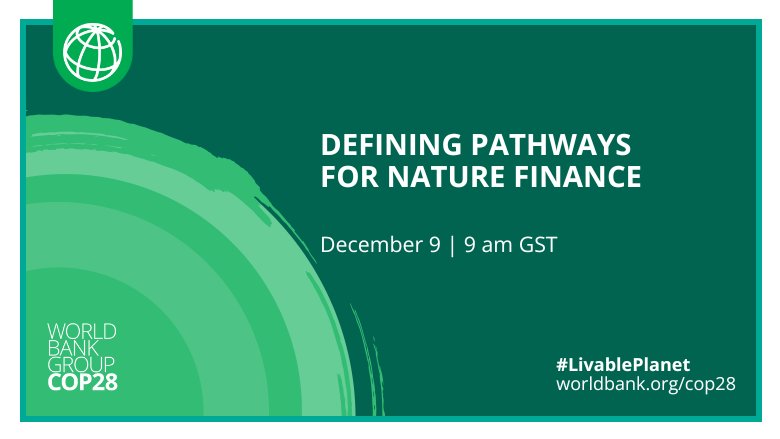Date, Time, and Location:
Saturday, December 9, 2023 | World Bank Pavilion | Blue Zone
Washington, D.C. 00:00-00:45 AM | UTC 05:00-05:45 | Dubai 09:00-09:45 AM

Date, Time, and Location:
Saturday, December 9, 2023 | World Bank Pavilion | Blue Zone
Washington, D.C. 00:00-00:45 AM | UTC 05:00-05:45 | Dubai 09:00-09:45 AM
Nature-based solutions are critical for addressing climate change, yet remain under-invested. Mobilizing finance for nature will require innovation and well-coordinated public-private partnership. This event engaged partners from public and private sectors to discuss innovative financing solutions, targeted policy interventions, and financial market reforms required for a more livable planet.
Integrating action on nature loss and climate change is needed to achieve impact, and nature-based solutions offer an opportunity to do so. The 2022 United Nations Biodiversity Conference (COP15) concluded with a landmark agreement to guide global action on nature through to 2030 and adopted the (GBF), which outlines a broad set of actions required to halt and reverse nature loss, including investments in nature-based solutions in developing countries. The scope of this challenge is significant - scaling investment in nature requires a comprehensive set of dedicated policy levers and financing approaches. Similar to the climate goals, successful implementation of the GBF requires closing a large financing gap through a combination of interventions both to ˇ°green financeˇ± and to ˇ°finance green.ˇ±
As public and private sectors are becoming more aware of the key role played by nature-based solutions in addressing climate change and preserving biodiversity, the World Bank is consolidating and scaling its work particularly on forests - to design solutions to build a sustainable forest economy that manages, restores, and conserves natural resources, creates jobs, and protects the interests of local communities.
This event presented how we approach this agenda by identifying key barriers to investments in nature-based solutions and proposing concrete interventions, with the engagement of speakers from the public sector, private sector, and civil society.